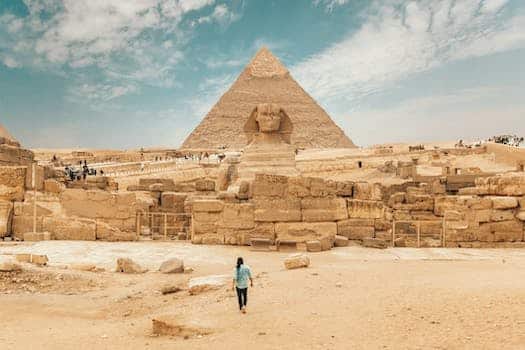Are you a passionate traveler seeking to immerse yourself in different cultures around the world? Look no further! In this article, we will explore the top 10 must-visit cultural travel experiences that will take you on a journey of discovery and enlightenment. From ancient traditions to vibrant festivals, get ready to embark on a truly enriching adventure that will leave you with unforgettable memories and a deeper appreciation for the diverse cultures that make our world so fascinating. Let’s dive in!
- 1. Introduction
- 1.1. What is cultural travel?
- 1.2. Benefits of cultural travel
- 1.3. Popular cultural travel destinations
- 1.4. How to plan for a cultural travel experience
- 1.5. Tips for maximizing cultural travel experiences
- 2. Immersing in Local Traditions
- 2.1. Participating in traditional festivals
- 2.2. Exploring local cuisine and culinary traditions
- 2.3. Learning traditional arts and crafts
- 2.4. Attending cultural performances
- 2.5. Staying in local accommodations
- 3. Interacting with Local Communities
- 3.1. Engaging with the locals
- 3.2. Learning the local language
- 3.3. Volunteering for community projects
- 3.4. Experiencing the daily life of locals
- 3.5. Joining cultural exchange programs
- 4. Exploring Historical and Heritage Sites
1. Introduction
Cultural travel experiences offer a unique way to explore the world and immerse ourselves in different traditions, customs, and lifestyles. These experiences allow us to gain a deeper understanding of other cultures, broaden our perspectives, and create lasting memories. In this article, we will take a look at 10 must-visit cultural travel experiences around the world that are sure to leave a lasting impression on any traveler. From ancient historical sites to vibrant festivals and traditional art forms, these destinations offer a rich tapestry of cultural heritage waiting to be discovered. Let’s embark on a journey of cultural exploration and discover the wonders that our world has to offer.
1.1. What is cultural travel?
Cultural travel, also known as cultural tourism, is a form of travel that focuses on experiencing and immersing oneself in the culture, traditions, history, and lifestyle of a particular destination. It goes beyond the typical tourist attractions and encourages travelers to engage with the local community, participate in cultural activities, and gain a deeper understanding of the destination’s heritage. Cultural travel offers a unique opportunity to explore diverse cultures, interact with locals, try traditional cuisines, witness traditional ceremonies and festivals, visit historical sites and museums, and appreciate the art, music, and dance forms of different regions. It allows travelers to broaden their horizons, challenge their perspectives, and foster cross-cultural understanding. By experiencing the authentic essence of a place, cultural travel enables individuals to create lifelong memories and develop a profound appreciation for the richness and diversity of our world.
1.2. Benefits of cultural travel
Cultural travel offers a unique and enriching experience for individuals seeking to broaden their horizons and immerse themselves in diverse cultures around the world. By venturing beyond popular tourist destinations, cultural travelers can gain a deeper understanding of different customs, traditions, and ways of life. This type of travel allows individuals to break away from their comfort zones and embrace new perspectives, fostering personal growth and expanding their worldview. In addition, cultural travel promotes cross-cultural connections and promotes mutual respect and appreciation among people from different backgrounds. Whether it’s exploring ancient ruins, participating in local festivals, or sampling traditional cuisine, cultural travel provides a multitude of benefits that go beyond mere sightseeing. It encourages empathy, tolerance, and a greater appreciation for the beauty of our diverse world.
1.3. Popular cultural travel destinations
When it comes to cultural travel experiences, there are countless destinations around the world that offer unique insights into different societies, traditions, and histories. These popular cultural travel destinations allow visitors to immerse themselves in the local culture, explore historical landmarks, taste traditional cuisines, and engage with local communities. From ancient ruins to vibrant festivals, here are ten must-visit cultural travel experiences that should be on every traveler’s bucket list:
1.4. How to plan for a cultural travel experience
Planning for a cultural travel experience is an exciting endeavor that allows you to immerse yourself in the rich heritage and traditions of different countries. It offers a unique opportunity to explore diverse cultures, witness historical landmarks, and engage with local communities. Whether you are a history enthusiast, an art lover, or simply someone seeking to broaden your horizons, cultural travel experiences can be incredibly rewarding.
To make the most of your cultural travel adventure, proper planning is essential. This involves considering various aspects such as destination selection, researching cultural sites and events, understanding local customs, and ensuring a smooth travel experience. By following a well-thought-out plan, you can maximize your cultural immersion and create lasting memories.
In this article, we will guide you on how to plan for a cultural travel experience, offering valuable tips and insights to help you make the most of your journey. So, get ready to embark on a fascinating exploration of the world’s must-visit cultural destinations!
1.5. Tips for maximizing cultural travel experiences
When it comes to cultural travel experiences, there are countless opportunities to immerse yourself in the rich heritage, traditions, and history of different countries around the world. Whether you are a seasoned traveler or just starting to explore the wonders of the world, maximizing your cultural travel experiences can greatly enhance your journey. By following these tips, you can make the most out of your trips and create memories that will last a lifetime.
1. Research and Plan Ahead: Before embarking on your cultural travel adventure, take the time to research the destination. Learn about its history, customs, traditions, and local etiquette. This will not only help you understand and appreciate the culture better but also avoid any unintentional misunderstandings.
2. Interact with the Locals: One of the best ways to truly experience a new culture is by engaging with the locals. Strike up a conversation, ask questions, and listen to their stories. Locals can provide valuable insights into their way of life, traditions, and hidden gems that may not be found in guidebooks.
3. Try the Local Cuisine: Food plays a significant role in every culture. Don’t be afraid to step out of your comfort zone and indulge in the local cuisine. Explore street food markets, try traditional dishes, and savor the flavors unique to the region. This will not only tantalize your taste buds but also give you a deeper understanding of the local culture and its culinary traditions.
4. Participate in Cultural Festivals and Events: Cultural festivals and events offer a vibrant glimpse into the heart and soul of a community. Research and plan your visit to coincide with any major festivals or events happening at your destination. Whether it’s witnessing colorful parades, traditional dances, or religious ceremonies, these experiences will leave a lasting impression.
5. Explore Beyond Tourist Sites: While iconic landmarks and tourist attractions are undoubtedly worth a visit, don’t limit yourself to just those. Take the time to wander off the beaten path and explore the lesser-known neighborhoods, local markets, and hidden gems. This will provide you with a more authentic and immersive cultural experience.
By following these tips, you can maximize your cultural travel experiences and create unforgettable memories. From engaging with the locals to trying local cuisine and exploring beyond the tourist sites, each step will contribute to a deeper understanding and appreciation of the diverse cultures that make our world so fascinating.
2. Immersing in Local Traditions
Immersing in local traditions is an essential aspect of cultural travel experiences around the world. It allows travelers to gain a deeper understanding of the customs, beliefs, and way of life of the local community. By participating in local traditions, tourists can experience the richness and diversity of different cultures firsthand. Whether it’s joining a traditional festival, learning a traditional craft, or participating in a religious ceremony, immersing in local traditions offers a unique and authentic travel experience. It allows travelers to connect with the locals on a deeper level, fostering cultural exchange and appreciation. From dancing the tango in Argentina to celebrating Diwali in India, there are numerous opportunities to immerse oneself in the vibrant traditions of different countries. Exploring local traditions not only broadens one’s cultural knowledge but also creates lasting memories and connections with the places visited.
2.1. Participating in traditional festivals
Participating in traditional festivals allows travelers to immerse themselves in the local traditions and cultures of a destination. These festivals often showcase the unique practices, rituals, and celebrations that have been passed down through generations. Whether it’s joining in the vibrant dancing and music of Carnaval in Rio de Janeiro, witnessing the awe-inspiring lantern festival in Taiwan, or taking part in the colorful Holi festival in India, participating in traditional festivals offers a truly immersive cultural experience. It allows travelers to interact with locals, learn about their customs, and gain a deeper understanding of the local way of life. From the costumes and decorations to the traditional foods and drinks, every aspect of these festivals is steeped in history and meaning. By participating in these festivities, travelers can create lasting memories and forge connections with the local community.
2.2. Exploring local cuisine and culinary traditions
Exploring local cuisine and culinary traditions is a delightful way to immerse oneself in the local traditions of a foreign destination. Every country has its own unique flavors, ingredients, and cooking techniques that reflect its culture and history. From enjoying a traditional Italian pasta dish in Rome to savoring the spicy street food of Bangkok, food can be a gateway to understanding the customs and traditions of a place.
When traveling, make it a point to try the local specialties and traditional dishes. Visit local markets, street food stalls, and authentic restaurants to fully experience the culinary traditions of the destination. Engage with locals, ask for recommendations, and be adventurous in trying new flavors and textures.
Apart from the taste, the act of sharing a meal with locals can provide insights into their way of life and foster connections. It is through food that you can truly immerse yourself in the local traditions and create lasting memories.
So, whether it’s learning how to make traditional sushi in Japan or taking part in a cooking class in Morocco, exploring the local cuisine and culinary traditions should be a top priority for cultural travelers.
2.3. Learning traditional arts and crafts
Learning traditional arts and crafts is a wonderful way to immerse yourself in local traditions while traveling. Whether it’s pottery-making in Japan, weaving in Peru, or wood carving in India, these hands-on experiences allow you to connect with the culture on a deeper level. By participating in workshops or classes, you not only gain new skills but also gain insights into the historical and cultural significance of these crafts. The process of creating something with your own hands can be incredibly rewarding and offers a unique opportunity to interact with local artisans. It’s a chance to learn from masters of their craft and witness the dedication and passion they put into their work. Through these immersive experiences, you can develop a greater appreciation for the artistry and craftsmanship that has been passed down through generations. So, if you’re looking to truly experience a destination’s culture, consider learning traditional arts and crafts as part of your travel itinerary.
2.4. Attending cultural performances
Attending cultural performances is a fantastic way to immerse oneself in the local traditions of a destination. Whether it’s witnessing a traditional dance performance in Bali, listening to soul-stirring opera in Italy, or enjoying the vibrant beats of a Brazilian samba show, these experiences offer a glimpse into the heart and soul of a culture. Cultural performances often showcase centuries-old traditions, passed down through generations, and provide a unique opportunity to witness the artistic expressions of a community. From the elaborate costumes and mesmerizing choreography to the live music and passionate performances, attending these shows can be a truly enriching experience. It allows travelers to connect with the local customs, understand the historical significance behind the performances, and appreciate the immense talent and dedication of the artists. Whether you’re a fan of music, dance, theater, or any other form of artistic expression, attending cultural performances should definitely be on your travel itinerary when seeking to immerse in local traditions.
2.5. Staying in local accommodations
Staying in local accommodations is a fantastic way to immerse oneself in the local traditions of a destination. By opting for a homestay, guesthouse, or a small local hotel, travelers can experience the true essence of a place and get a glimpse into the daily lives of the locals. This type of accommodation allows for interactions with the local community, providing opportunities to learn about their traditions, customs, and way of life. From participating in cooking classes to joining traditional ceremonies and celebrations, staying in local accommodations offers a unique cultural experience that goes beyond typical tourist activities. Additionally, supporting local businesses and staying in smaller accommodations helps to contribute to the local economy and sustain the traditions of the community. Whether it’s sharing meals with local families, learning traditional crafts, or simply engaging in conversations with the locals, staying in local accommodations enables travelers to create lasting memories and forge genuine connections with the destination’s culture.
3. Interacting with Local Communities
Interacting with local communities is an essential aspect of cultural travel experiences around the world. It allows travelers to immerse themselves in the local culture, interact with the people, and gain a deeper understanding of their traditions, customs, and way of life. By engaging with the locals, travelers can learn about the history, art, music, food, and language of a particular destination. It also provides an opportunity to exchange ideas, share stories, and build meaningful connections. Whether it’s participating in a traditional dance workshop in Africa, joining a cooking class in Asia, or volunteering at a local community project in South America, interacting with local communities adds a unique and enriching dimension to any cultural travel experience.
3.1. Engaging with the locals
Engaging with the locals is an essential aspect of cultural travel experiences around the world. Interacting with local communities allows travelers to immerse themselves in the local culture, gain a deeper understanding of the destination, and create meaningful connections. Whether it’s participating in traditional ceremonies, joining local festivals, or simply engaging in conversations with residents, these experiences provide a unique opportunity to learn, explore, and appreciate the rich heritage and traditions of a place. By engaging with the locals, travelers can also support the local economy and contribute to sustainable tourism practices. It’s important to approach these interactions with respect, curiosity, and an open mind, as it allows for a more authentic and enriching travel experience.
3.2. Learning the local language
Learning the local language is essential for interacting with local communities during your cultural travel experiences. Not only does speaking the local language help you communicate effectively, but it also shows respect and appreciation for the local culture. By making an effort to learn a few key phrases or expressions, you can break down barriers and form deeper connections with the locals. Whether it’s ordering food at a local market, asking for directions, or engaging in meaningful conversations, speaking the local language opens up a world of possibilities for authentic cultural experiences. Additionally, learning the local language allows you to gain a better understanding of the cultural nuances, traditions, and customs, enhancing your overall travel experience. So, before embarking on your cultural adventure, take the time to learn some basic phrases and embrace the opportunity to immerse yourself in the local language.
3.3. Volunteering for community projects
Volunteering for community projects is a rewarding way to immerse yourself in the local culture and make a positive impact on the communities you visit. It allows you to interact with locals on a deeper level and gain a better understanding of their way of life. There are numerous opportunities to get involved in community-driven initiatives, such as environmental conservation, education, healthcare, and infrastructure development.
By volunteering, you can contribute your skills and expertise to make a difference while learning about the unique challenges and triumphs of the local community. Whether it’s teaching English to children, building homes, or assisting in agricultural projects, volunteering provides a hands-on experience that goes beyond the typical tourist activities.
Interacting with local communities through volunteering also allows you to forge meaningful connections and create lasting friendships. You’ll have the chance to exchange ideas, stories, and traditions with the locals, gaining a deeper appreciation for their cultural heritage. Additionally, volunteering often provides opportunities to participate in local festivals, ceremonies, and traditions, giving you a firsthand experience of the community’s customs and rituals.
Furthermore, engaging in community projects can enhance your understanding of global issues and inspire you to become a more responsible traveler. By actively participating in initiatives that promote sustainable development and social justice, you can contribute to creating a more equitable world. Volunteering for community projects is not just about giving back, but also about personal growth and gaining a broader perspective on the world.
When planning your cultural travel experiences, consider dedicating some time to volunteering for community projects. It will undoubtedly enrich your journey, allowing you to make a positive impact while immersing yourself in the vibrant tapestry of local cultures.
3.4. Experiencing the daily life of locals
Experiencing the daily life of locals is one of the most enriching cultural travel experiences. It allows travelers to immerse themselves in the authentic traditions, customs, and lifestyles of the local community. By interacting with locals on a daily basis, visitors can gain a deeper understanding of their culture, values, and way of life. Whether it’s participating in traditional ceremonies, joining local families for meals, or engaging in community activities, this immersive experience offers a unique perspective and fosters meaningful connections. Exploring the local markets, strolling through residential neighborhoods, and observing daily routines provide valuable insights into the daily life of locals and their interactions within the community. It’s an opportunity to break away from the tourist bubble and truly engage with the people and their traditions, leaving a lasting impression and creating unforgettable memories.
3.5. Joining cultural exchange programs
Joining cultural exchange programs allows travelers to have immersive experiences and interact with local communities. These programs provide a unique opportunity to learn about different cultures, traditions, and customs directly from the people who live them. By participating in cultural exchange programs, travelers can gain a deeper understanding of the destination they are visiting and forge meaningful connections with locals. Whether it’s volunteering at a local school, staying with a host family, or participating in community events, interacting with local communities through cultural exchange programs can enrich one’s travel experience and create lasting memories.
4. Exploring Historical and Heritage Sites
Exploring historical and heritage sites is a must for any cultural traveler. These sites offer a glimpse into the rich history and traditions of a region, allowing visitors to immerse themselves in the past. From ancient ruins to well-preserved architectural wonders, there are countless sites around the world that are worth exploring. Whether it’s walking through the ruins of Machu Picchu in Peru, marveling at the grandeur of the Taj Mahal in India, or exploring the ancient city of Petra in Jordan, these sites offer a unique and captivating experience. Each site has its own story to tell, and by visiting them, travelers can gain a deeper understanding of the cultures that shaped them. So, if you’re looking to embark on a cultural travel adventure, be sure to include some of these historical and heritage sites on your itinerary.
4.1. Visiting ancient ruins and archaeological sites
Visiting ancient ruins and archaeological sites allows travelers to immerse themselves in the rich history and cultural heritage of different civilizations. These sites provide a glimpse into the past, showcasing the architectural prowess, artistic achievements, and societal structures of ancient societies. Exploring historical and heritage sites offers a unique opportunity to witness the remnants of ancient civilizations, understand their way of life, and appreciate the significance of their contributions to human history. From the magnificent pyramids of Egypt to the impressive ruins of Machu Picchu in Peru, there are numerous must-visit cultural travel experiences around the world that offer a deep connection to our collective past.
4.2. Exploring UNESCO World Heritage Sites
Exploring UNESCO World Heritage Sites
UNESCO World Heritage Sites are a testament to the rich history and cultural significance of various locations around the globe. These sites are recognized for their outstanding universal value and are carefully preserved to ensure their protection for future generations. Exploring these historical and heritage sites offers a unique opportunity to delve into the past, unravel fascinating stories, and appreciate the remarkable achievements of ancient civilizations.
From ancient ruins to architectural wonders, UNESCO World Heritage Sites provide a glimpse into the diverse cultural heritage of humanity. Whether it’s the iconic Great Wall of China, the awe-inspiring Pyramids of Giza in Egypt, or the grandeur of the Taj Mahal in India, each site offers a captivating journey through time.
Visiting these sites allows travelers to immerse themselves in the traditions, art, and architecture of different civilizations. It offers a chance to witness the remarkable engineering feats of the past, marvel at intricate craftsmanship, and gain a deeper understanding of the cultural tapestry that has shaped our world.
The UNESCO World Heritage Sites are not only significant for their historical value but also for their natural beauty. From stunning national parks and breathtaking landscapes to pristine ecosystems, these sites provide a sanctuary for wildlife and contribute to the conservation of our planet’s biodiversity.
Exploring UNESCO World Heritage Sites is an enriching experience that combines education, adventure, and appreciation for the wonders of our world. It allows us to connect with our shared human history, fostering a sense of global unity and understanding. So, pack your bags, embark on a cultural journey, and discover the remarkable stories that these extraordinary sites have to offer.
4.3. Discovering historical landmarks
Exploring Historical and Heritage Sites
One of the most enriching experiences in cultural travel is discovering historical landmarks. These sites not only offer a glimpse into the past but also showcase the rich heritage and traditions of a particular region or country. From ancient ruins to iconic monuments, the world is filled with remarkable historical sites waiting to be explored.
When embarking on a cultural travel adventure, make sure to include visits to these must-visit historical and heritage sites:
1. The Great Wall of China: Spanning over 13,000 miles, this architectural marvel is an iconic symbol of Chinese history and culture.
2. Machu Picchu, Peru: Nestled high in the Andes Mountains, this ancient Inca city offers breathtaking views and a fascinating glimpse into the Inca civilization.
3. The Colosseum, Italy: As one of the world’s most famous amphitheaters, the Colosseum stands as a testament to the grandeur of the Roman Empire.
4. Angkor Wat, Cambodia: This magnificent temple complex is a UNESCO World Heritage Site and a stunning example of Khmer architecture.
5. Petra, Jordan: Carved into the rose-colored sandstone cliffs, Petra is an archaeological treasure and a must-visit for history enthusiasts.
6. Taj Mahal, India: Known as the epitome of love, this marble mausoleum is a UNESCO World Heritage Site and a masterpiece of Mughal architecture.
7. The Acropolis, Greece: Perched on a hilltop in Athens, the Acropolis is home to ancient ruins, including the iconic Parthenon.
8. Chichen Itza, Mexico: This ancient Mayan city features impressive pyramids, temples, and a large ball court.
9. Stonehenge, England: A mysterious prehistoric monument, Stonehenge continues to captivate visitors with its enigmatic history.
10. The Pyramids of Giza, Egypt: These ancient wonders, including the Great Pyramid, are a testament to the incredible engineering skills of the ancient Egyptians.
Exploring these historical and heritage sites allows travelers to immerse themselves in the rich history and cultural significance of different civilizations. Whether it’s marveling at the architectural wonders of the past or unraveling the mysteries of ancient civilizations, these experiences offer a deeper understanding of our shared human history.
4.4. Understanding the cultural significance of monuments
Monuments hold immense cultural significance as they stand as tangible symbols of history and heritage. These structures, whether they are ancient ruins, iconic landmarks, or grand architectural marvels, provide a glimpse into the past and the civilizations that once thrived. Exploring historical and heritage sites allows travelers to immerse themselves in the rich tapestry of different cultures and understand the legacies left behind by their ancestors. By visiting these sites, one can witness the architectural brilliance, artistic expressions, and societal values that shaped the world we live in today. Each monument tells a unique story, representing a particular era, dynasty, or event that shaped the identity of a region or a nation. Whether it’s the majestic pyramids of Egypt, the awe-inspiring Taj Mahal in India, or the ancient city of Machu Picchu in Peru, these cultural treasures provide a deeper understanding of our shared human history and the diverse civilizations that have shaped our world.
4.5. Exploring museums and cultural centers
Exploring museums and cultural centers allows travelers to delve into the rich history and heritage of a destination. These institutions serve as custodians of art, artifacts, and historical relics, providing valuable insights into the past. Museums offer a glimpse into the lives of ancient civilizations, showcasing their achievements, traditions, and cultural practices. Through carefully curated exhibitions and interactive displays, visitors can learn about pivotal moments in history, famous figures, and significant events that have shaped the world we live in today. Cultural centers, on the other hand, provide a space for artistic expression, performances, and cultural exchange. They often host art exhibitions, music concerts, dance performances, and workshops, offering a chance to engage with the local culture and traditions. Whether it’s wandering through the halls of renowned art museums, exploring archaeological sites, or attending a traditional dance performance, exploring historical and heritage sites is a must for any cultural traveler.
Conclusion
In conclusion, these 10 must-visit cultural travel experiences around the world offer a unique opportunity to explore and immerse oneself in the rich and diverse heritage of different cultures. From ancient ruins and historical landmarks to vibrant festivals and traditional arts, these destinations provide an unforgettable journey that will broaden your horizons and leave you with lasting memories. Whether you’re a history enthusiast, an art lover, or simply curious about different traditions, these cultural travel experiences are sure to captivate and inspire.





